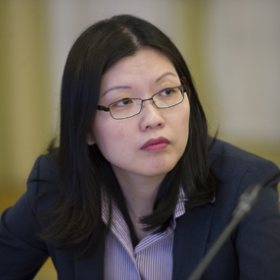
1st U.S.-China Breakthrough
EWI launches its 1st U.S.-China High-Level Political Party Leaders Dialogue.
The announcements that Chinese President Hu Jintao would attend this week’s Nuclear Security Summit in Washington and that the U.S. Department of Treasury would defer its anticipated announcement on China’s currency seemed to signal a positive turn in U.S.-China relations. After the high-profile disputes over human rights, Taiwan, Tibet, and trade that dominated relations between the two powers in the first quarter of 2010, both governments are expressing greater confidence in the near-term prospects for U.S.-China ties.
The relationship between the two governments is not the only thing that is on the mend; the political establishments of the two countries are also stepping up their engagement with each other. Coordinated by EWI, a delegation of prominent U.S. Democrats and Republicans met with senior representatives of the Communist Party of China (CPC) from March 31 to April 2 in Beijing in the “First U.S.-China High-Level Political Party Leaders Dialogue.” Hailed by long-time China watchers as “the final chapter in the story of U.S.-China normalization” and “the most significant development in U.S.-China relations in a decade,” the Dialogue provided an unprecedented opportunity for authoritative figures from the three parties to discuss issues of common concern. Along with EWI and the CPC, the National Democratic Institute (NDI) and International Republican Institute (IRI) played significant roles in the planning of this historic visit.
Both the Chinese and foreign media noted the significance of this event. As the Associated Press put it, “In another about face, senior representatives of the Democrat and Republican parties were in Beijing this week for talks with the Communist Party…While Britain's Labor Party and other Western democratic parties have held such parleys before, the talks were the highest-level discussions ever between American and Chinese politicians…”
The U.S. delegation comprised eighteen members; the ten principal U.S. delegates were:
- The Honorable Madeleine K. Albright, former U.S. Secretary of State
- Mr. Lorne Craner President of the International Republican Institute
- The Honorable Thomas A. Daschle, former U.S. Senate Majority Leader
- The Honorable Howard Dean, former Governor of Vermont; and former Chairman of the Democratic National Committee
- Mr. Mike Duncan, former Chairman of the Republican National Committee
- Mr. John Mroz, President and CEO of the EastWest Institute
- Mr. H. Ross Perot, Jr., Chairman-elect of the EastWest Institute
- The Honorable Vin Weber, former U.S. Congressman (Minnesota-02)
- The Honorable Richard S. Williamson, former U.S. Special Envoy to Sudan
- Mr. Kenneth Wollack, President of the National Democratic Institute
The Chinese delegation included:
- Mr. Wang Jiarui, Minister, International Department of the Communist Party of China (IDCPC)
- Mr. Liu Jieyi, Vice Minister, IDCPC
- Mr. Li Jun, Director-General, Research Office, IDCPC
- Ms. Xu Luping, Director-General, Bureau of North American, Oceanian and Scandinavian Affairs, IDCPC
- Mr. Ma Hui, Deputy Director-General, Bureau of North American, Oceanian and Scandinavian Affairs, IDCPC
- Mr. Li Mingxiang, Deputy Director-General, Bureau of North American, Oceanian and Scandinavian Affairs, IDCPC
- Mr. Shi Guohui, Assistant Director-General, Bureau of North American, Oceanian and Scandinavian Affairs, IDCPC
In addition to meetings with top officials in the IDCPC, the U.S. delegation also met with Chinese Vice President Xi Jinping, State Councilor Dai Bingguo, and senior party and government officials in the CPC’s United Front Work Department and State Council Taiwan Affairs Office. U.S. Ambassador to China Jon Huntsman hosted a luncheon in honor of the Chinese and U.S. delegates.
In the course of the three days of discussions, the two sides exchanged views on a wide range of domestic topics, including the U.S. and Chinese political and social systems, methods of gauging national sentiment in the two countries, human rights, Taiwan, Tibet, and the impact of the Internet on the two societies; and also on international topics such as Iran, North Korea, Sudan, Myanmar, non-proliferation and climate change.
EWI, working with NDI and IRI, will coordinate a reciprocal visit by the CPC to Washington in late 2010.

